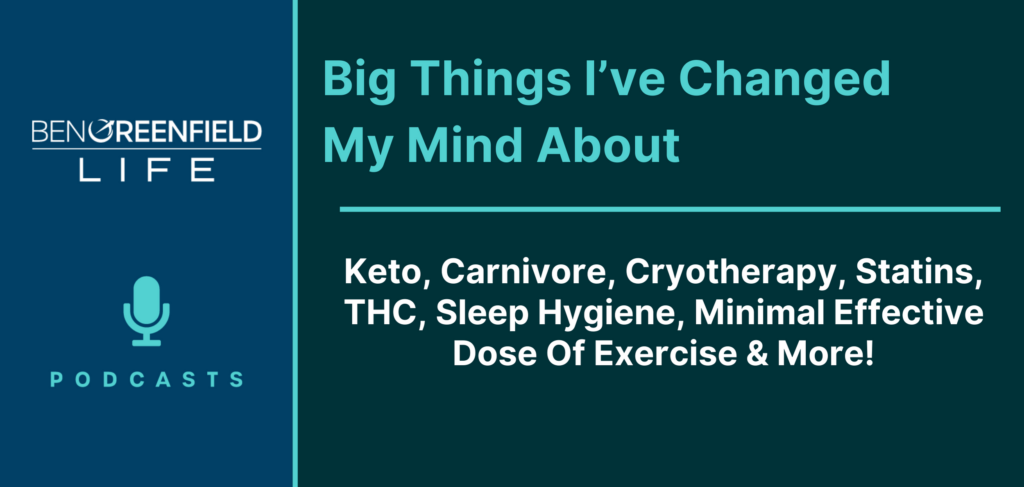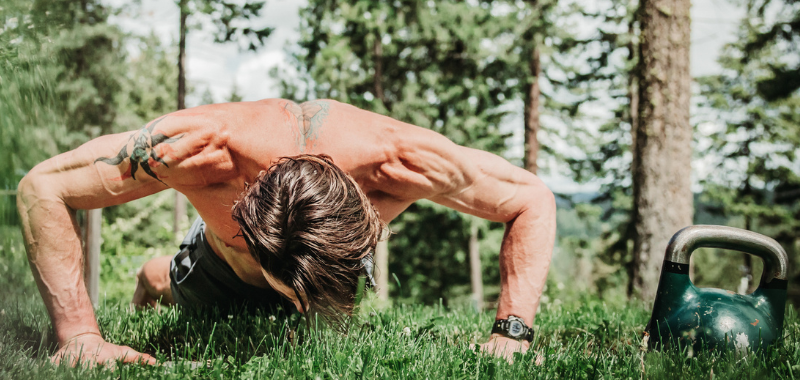October 19, 2016
Click here for the full written transcript of this podcast episode.
September 28, 2016 Podcast: 360: What Your Poop Can Tell You About Your Health, How To Heal Tendons & Ligaments Faster, Natural Ways To Decrease Cortisol & More!
NEW! Click here for the official BenGreenfieldFitness calendar of events.
Have a podcast question for Ben? Click the tab on the right (or go to SpeakPipe), use the Contact button on the app, click Ask a Podcast Question at the bottom of this page, or use the “Ask Ben” form at the bottom of this page.
—————————————————–
News Flashes:
You can receive these News Flashes (and more) every single day, if you follow Ben on Twitter.com/BenGreenfield, Instagram.com/BenGreenfieldFitness, Facebook.com/BGFitness and Google+.
—————————————————–
Special Announcements:
This podcast is brought to you by:
–FourSigmatic Mushroom Extracts – use code “bengreenfield” for 15% off
–Indochino – you get any premium Indochino suit for just $389 when entering code FITNESS at checkout. Plus, shipping is FREE!
–Camel Milk – use code BEN20 for 20% off!
-Clearlight is GIVING away a sauna to Ben Greenfield Fitness Fans. Click here to enter.
– Going to the Tough Mudder in Vegas? Come hang out with Ben at this Meetup! Click here t0 register.
–Click here to follow Ben on Snapchat, and get ready for some epic stories on his morning, daily and evening routine! What did you miss this week? A clay mask, a park workout, a morning routine change-up, an epic post-race salad and more.
NEW! Click here for the official BenGreenfieldFitness calendar.
Nov 17-18, 2016: Ben is speaking at the Biohacker's Summit in Helsinki, Finland. Discover the latest in wearables, internet of things, digital health, and mobile apps to increase performance, be healthier, stay fit, and get more done. Learn about taking food, preparation, cooking, and eating to the next level with the latest science and kitchen chemistry. Even delve into implanted chips, gene therapy, bionic arms, biometric shirts, robotic assistants, and virtual reality. Two days with an amazing crowd and a closing party with upgraded DJs to talk about. Click here to get in now at a 40% discount.
Nov 11-14, 2016: Ben is speaking at this year's Weston A. Price Wise Traditions on real food to enhance physical and mental performance. If you're an athlete, this is the talk for you! Click here to sign up.
Did you miss the weekend podcast episode with Peter Shankman? It was a must-listen – “Why ADD and ADHD Are Good For You, (And Supplements, Foods, And Lifestyles to Help With ADD and ADHD) ”. Click here to listen now or download for later!
Grab this Official Ben Greenfield Fitness Gear package that comes with a tech shirt, a beanie and a water bottle.
And of course, this week's top iTunes review – gets some BG Fitness swag straight from Ben – click here to leave your review for a chance to win some!

——————————————
Listener Q&A:
As compiled, deciphered, edited and sometimes read by Rachel Browne, the Podcast Sidekick.
What Your Poop Can Tell You About Your Health
Annie says: Annie has a question about poop. She's noticed that some foods come out the same way they look going in. Corn, quinoa, nuts, raw carrots and beans are some of the perpetrators. She recently made a big batch of KIN-I-OA, which is similar to Quinoa, and she lost her appetite just looking at it. So she was wondering what it means when she can see pieces of food in her poop? Are they being digested, is she absorbing their nutrients? If not, is it worth even eating them? And is there anything she can do to make them more bioavailable? Like eating nut butters over whole nuts?
How To Heal Tendons & Ligaments Faster
Yoddy says: He's undergoing major ligament and tissue surgery his wrist at the end of the month for a congenital hand problem. His recovery time is 2-3 weeks for skin, 4-6 weeks for ligament and tissue, 6 weeks in a splint, and 10 weeks of physio. A couple of weeks ago you sent him an article on Twitter that was skewed toward healing bones and joints. What would you do in order to maximize recovery and healing of tissue and ligaments?
Float Tanks vs. Epsom Salt Baths
Miguel says: Miguel is from Texas and he's wondering what your opinion is on float tanks and float therapy. He loves taking magnesium baths an he's curious if there's much difference between magnesium baths and float therapy. And finally, what are pros and cons in regards of increased brain chemicals, stress relief and recovery. Where does float therapy stack up compared to other relaxation modalities?
–Magnetic Clay Magnesium Salts/Topical Magnesium
How To Get Your Cycle Back After Being On The Pill
Becka says: She's a 25 year old endurance runner and long time fan of the show. She has a question about preparing for pregnancy as her husband and her are looking to start a family soon. After 10 years of being on birth control, she's finally ready to get off the pill. Do you have any recommendations for how to get her cycle to restart naturally? She's also wondering what prenatal vitamins you recommend that won't break the bank? Also, should she scale back on exercise while she's trying to conceive? She listened to the last podcast with tips on how to increase fertility in men, but can you do the same for women? Do you have any other suggestions on how she can best increase her chances of getting pregnant?
In my response, I recommend:
–Thorne Prenatal
–Probiotic
–Topical Magnesium
–Code Red
—————————————————–
Prior to asking your question, do a search in upper right hand corner of this website for the keywords associated with your question. Many of the questions we receive have already been answered here at Ben Greenfield Fitness!
Ask Your Question
—————————————————–















Green coffee beans have slightly more caffeine than roasted beans. The roasting diminishes that, but not much. Dark roasted coffee will actually have less caffeine than lighter roasted coffee from the same beans.
Rachel asked if decaffeinated beans have more caffeine than green beans. All unprocessed (and therefore green) coffee beans have caffeine. To decaffeinate them they are processed to remove caffeine. Then they’re roasted like regular non-decaffeinated beans to produce “decaf”.
I have a couple questions after listening to this one.
I’m intrigued about green coffee beans!
1. How can green coffee beans have a different caffeine level than roasted beans? I don’t understand how roasting would add caffeine?
2. How do you prepare green coffee beans? I went to my local roaster and told him I heard you mention them on your podcast so he gave me a bag to try out. On the way out he said, “be sure not to use your grinder though, these things are as hard as rocks.” Which seems to be true. Do you sprout them first? Are the green coffee beans you are using dried out?
Coffee beans are naturally green, but they are usually roasted before being sold to the consumer. This is the process that turns them brown. Coffee beans are loaded with antioxidants and pharmacologically active compounds. Two of the most important ones are Caffeine and Chlorogenic Acid. Chlorogenic Acid is believed to be the main active ingredient in green coffee beans. Unfortunately…. most of the chlorogenic acid is removed when coffee is roasted! Anyways, yes, you still need to soak them, etc first and here are exact instructions: https://ineedcoffee.com/making-green-bean-extract…
I am an (amateur) athlete and often sore. Every morning I down a cocktail blend of herbs that I learned are healthy from you: turmeric, Ceylon cinnamon, cayenne, spirulina, ginger, gelatin, and apple cider vinegar. Is consuming more than 1 tablespoon of turmeric daily bad for muscle, tendon, and ligament recovery due to the suppression of inflamation?
*and black pepper!
Why isn’t there any transcript available yet? Is it too early for that?
Yes – it will be about two weeks! Stay tuned!
Ben you mention not using anti-inflammatory substances natural and prescription if I have an inflamed tendon. I just received prp 10 days ago and would like to use Bpc 157 to help with the healing. If you had prp done when would you start using Bpc to help heal the tendon. I’ve been trying to heal this posterior tibia tendon for far too long so would you suggest anything else to do or avoid?
You can use it right off the bat. But I'm not a doctor so don't take this as medical advice! I have plenty more things that can help you in my book at http://www.BeyondTrainingBook.com and if you want to go into detail on your situation book a consult at https://bengreenfieldfitness.com/coaching and choose 20 or 60 minutes and we'll get you scheduled.
Ben how can i get a hold of you or someone on your staff regarding business? I want to make you aware of product my friend made i think youd want to know if it its literally the only one of its kind not trying to bs you
[email protected] is the best way!
some cool research on healing soft tissue injuries
http://www.gssiweb.org/en/Article/sse-142-trainin…
Ben, Rachel! Get your magnesium chloride at the farm store, any one that is a dairy supplier. I get a 25kg bag for NZ$12. Cheap as chips.
We heat our outside (er, only) bath with a wood fire. Bathing under the stars. A good way to bone up on constellations… we get a particularly good view of the Southern Cross. The nearest lights are 5kms away. The only problem is not falling asleep after half an hour.
That sounds blissful!
Are the prenatal vitamins FDA approved?
Yes, absolutely.
The rebounder/trampoline information was fascinating. Great podcast. LOVE these Q&As with Rachel.
I’ve got a question, though. What are the difference between jumping up and down on the floor vs. a trampoline? I understand that there are some obvious differences in the shock of jumping on the ground vs a trampoline, but what about physiological differences? Differences in the benefits that you mentioned. Say I am ok with risking joint damage that might come from jumping up and down on the floor or grass. Do I still get the blood flow and lymph flow benefits? It seems intuitive that you would.
I like exercise equipment, but I’d also prefer to only buy what is actually necessary. Curious to know your thoughts.
Cheers,
David
Honestly the only difference (and it's a BIG one!) is joint impact!